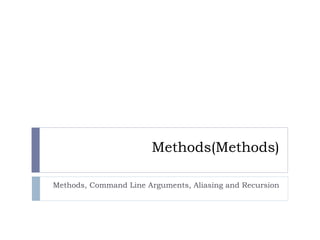
Comp102 lec 7
- 1. Methods(Methods) Methods, Command Line Arguments, Aliasing and Recursion
- 2. Introduction Method is a part of class Contains particular set of instructions One method in one class of program Main Method Classes can contain many methods A method should perform a single well defined task Two parts to be done in a program Declare and Define a method Call a Method Program jumps to execute instructions written in program and after executing them in sequential manner, comes back to the calling instruction
- 3. Introduction Have you ever invoke (call) a method? Scanner sc = new Scanner(System.in); int x = sc.nextInt(); System.out.println(“Hello”);
- 6. Methods – Without Arguments public class xyz { public static void main(String[] args) { foo(); // Method call } static void foo() // Method definition { // start of Method body System.out.println("Hello World"); // Method body }// end of Method body }
- 7. Methods – With Arguments public class xyz { public static void main(String[] args) { int x; x=15; foo(x); // passing x as parameter } static void foo(int a) // creating a alias of x { System.out.println("value is: "+a); } }
- 8. Methods – with multiple arguments public class xyz { public static void main(String[] args) { int x = 15, y= 20; double z= 20.5; foo(x, y, z); } static void foo(int a, int y, double c) { System.out.println("x or a: "+a); System.out.println("y: "+y); System.out.println("z or c:"+c); } }
- 9. Methods with shared data public class xyz { static int z= 20; // shared by all Methods of class xyz public static void main(String[] args) { int x; x=15; foo(x); System.out.println("Z=: "+z); } static void foo(int a) { System.out.println("value is: "+a); System.out.println("value is: "+z); } }
- 10. Methods – return Value public class xyz { public static void main(String[] args) { int x = 15, y= 20; int result = foo(x, y); //outcome is received in variable System.out.println("result is: "+result); } static int foo(int a, int b) // data type of return is defined { int sum; sum= a+b; return sum; // return a variable or value } }
- 11. The type of the expression in the return statement must match the return type in the Method header.
- 12. • Formal parameters are variables that are declared in the header of the Method definition. • Actual parameters are the expressions in the calling statement. • The formal and actual parameters must match exactly in type, order, and number. Their names, however, do not need to be the same.
- 13. It is the nature of the task to be performed, not the amount of code, that determines if a Method should be used.
- 14. Variables are in scope from their point of definition until the end of their Method or block.
- 15. ACCESSING Method Defined in some other class CLASS A CLASS B class ABC public class B { { static void func1() public static void main(String[] args) { { System.out.println(“hello”); ABC a1 = new ABC(); } a1.func1(); } } }
- 16. class ABC { static void func1() { System.out.println("Hello"); } } public class xyz { public static void main(String[] args) { ABC a1 = new ABC(); a1.func1(); } }
- 18. Command-Line Arguments A Java application can accept any number of arguments from the command line. This allows the user to specify configuration information when the application is launched. The user enters command-line arguments when invoking the application and specifies them after the name of the class to be run While running the program any things written after the name of the class are the command line arguments. Arguments are delimited by the space.
- 19. String Command-Line Arguments public class Echo { public static void main (String[] args) { for (String s: args) { System.out.println(s); } } } javac Echo.java java Echo Hello to the World Output:
- 20. String Command-Line Arguments public class Echo { public static void main (String[] args) { for (int i=0; i<args.length; i++) { System.out.println(args[i]); } } } javac Echo.java java Echo Hello to the World Output:
- 21. Integer Command-Line Arguments public class Echo { public static void main (String[] args) { int argument; for (int i=0; i<args.length; i++) { argument = Integer.parseInt(args[i]); System.out.println(argument); } } } javac Echo.java
- 22. RecuRsion
- 25. Every recursive call must either solve part of the problem or reduce the size of the problem.
- 26. Towers of Hanoi—start position
- 27. Towers solution for two disks
- 28. Towers solution for three disks
- 29. Towers solution for three disks (continued)
- 30. Recursive program of factorial public class recursive { public static void main (String[] args) { int n=5; int factorial=fact(n); System.out.println("factorial is: "+factorial); } static int fact(int number) { if(number == 1) { return 1; } else { return (number * fact(number-1));//self calling Methods } } }
